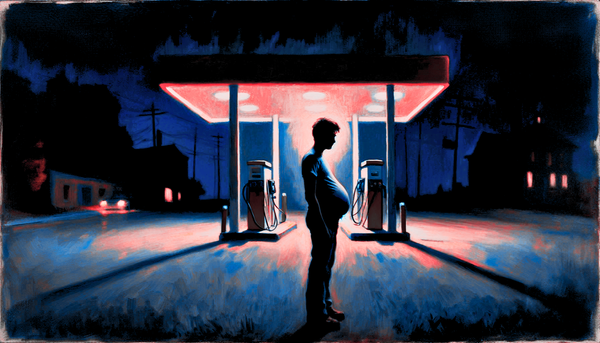11 Compound Words for Feelings We Can’t Quite Name
A quiet taxonomy of compound nouns that close the distance between thought and feeling

The idea of simplicity through complexity finds a natural home in the German language. Within its structure, compound nouns like Schadenfreude and Fernweh ("farsickness") capture complex feelings in ways English often struggles to express without lengthy explanations.
This isn’t just about linguistic efficiency. It reflects a deeper mode of perception, where internal experience is not only named but actively shaped through language itself.
1. The Mechanics of German Compound Nouns
When pared down, German compounds join nouns or noun phrases in a building-block system that lets speakers tailor meaning precisely. Take Schadenfreude, for example:
Schaden = harm, hurt, damage
Freude = joy
Schaden + Freude = Schadenfreude—a dark joy that stems from someone else’s pain
Here, the head of the compound—usually the last noun ("Freude")—defines the category, while the preceding elements ("Schaden") specify or qualify it.
Thanks to this morphological flexibility, concepts that would otherwise require lengthy phrasing in English become instantly recognisable, emotionally rich units in German.
Not only does this streamline articulation, but it also fosters clearer, more meaningful understanding between speaker and listener.
2. Emotional Clarity and Cognitive Framing
At its core, each compound acts as a linguistic shortcut for nuanced emotional states that English often struggles to express.
These words bring clarity and validation to feelings that might otherwise remain vague or difficult to convey. In this way, they contribute to a shared emotional reality.
Take Weltschmerz (Welt = world, Schmerz = pain, grief), for example: it captures a deep, existential melancholy about the world’s imperfection—something English struggles to label succinctly.
3. Experiment: Compounding Experience in English
What if English adopted compound nouns more systematically? Could we invent new words to enrich our emotional vocabulary and deepen our shared understanding?
Might this shift deepen our emotional awareness or change how we express ourselves—socially, creatively, even in literature? In many ways, it echoes a kind of lexical mutation we’ve touched on before: form altering feeling.
To explore this idea, let's try a small thought experiment: what if English borrowed German’s structural lens?
Invented Compound Nouns: A Small Lexicon
Here are some coined terms to give shape to those odd, liminal feelings we often struggle to name:
Askshadow
Definition: The lingering emotional tension caused by a question that was never asked but deeply wanted to be.
Context: “The sleepover wasn’t the same after their talk. One of the girls had the distinct feeling her friend had held something back. She sat silent and tense in her askshadow.”
Mindcrack
Definition: The sudden awareness that a long-held belief or assumption might be wrong.
Context: “She sat still for a moment, the evidence contradicting everything she thought she'd known. The mindcrack settled in, sharp and painful.”
Choicefog
Definition: The cognitive blur or paralysis when faced with too many options.
Context: “Scrolling through job listings sent her straight into a choicefog. Nothing stood out; everything felt wrong.”
Faceframe
Definition: The curated, socially acceptable version of someone’s expression or mood in public.
Context: “He wore his usual faceframe at the meeting—calm, polite, unreadable.”
Mouthframe
Definition: A more precise variant of faceframe, describing how we shape or neutralise tone and intonation to mask true intent in speech.
Context: "Talking to him is impossible. He's all mouthframe all the time—painfully neutral, never revealing what he really means."
Backlogic
Definition: The retrospective rationalisation of a choice that was made on gut instinct.
Context: “His explanation felt like backlogic. And there was a hint of panic in his tone.”
Bodyecho
Definition: The physical aftereffect of a past emotion or event, like tension held in the shoulders or a lump in the throat.
Context: “Even long after the meeting with her father ended, her bodyecho left her with clenched hands and jaw.”
Intentleak
Definition: When someone's true motive slips out unintentionally through wording or behaviour.
Context: "The president’s speech was convincing until the intentleak at the end."
Talkloop
Definition: The frustration of having to explain yourself repeatedly.
Context: “She was stuck in a talkloop at the party, repeating the same point to a bunch of strangers.”
Replywait
Definition: The mental tension or unease while waiting for a reply.
Context: “He kept checking his phone during dinner. He’d had a fight with his boyfriend earlier that day and was stuck in replywait.”
Moodbleed
Definition: When emotional tone unintentionally spills from one context into another.
Context: "She ended up screaming at her kids after a stressful day at work. The guilt from the moodbleed kept her up all night."
Each of these compound nouns captures a distinct emotional or psychological state that could feasibly be used as a quick response to a question like “Why do you seem off?”
For example:
- Askshadow → "It’s just...askshadow. You know?"
- Mindcrack → "Had a bit of a mindcrack today."
- Replywait → "Still in replywait."
- Moodbleed → "Moodbleed. From earlier."
4. Psycholinguistic Implications
Using compound nouns like these helps to externalise complex internal experiences, making it easier to understand and manage emotions.
Does the absence of such terms in English lead to emotional vagueness or repression? Perhaps.
What's less abstract is the prospect of explaining our thoughts in looping, potentially misunderstood ways—something that almost always stops us in our tracks. We’d rather swallow the feeling than waste time and energy trying to shape it into someone else’s consciousness.
5. Conclusion: Language as a Reality-Shaping Construct
German compound nouns show us how language can precisely weave emotional and conceptual clarity, shaping both collective understanding and individual experience.
By experimenting with form and function, English may yet carve new passageways through the labyrinth of the self—letting us see more clearly and empathetically, speak more truthfully, and listen with finer attunement to the quiet signals of our inner lives.
And so, we arrive at a profound question: what if, rather than simply reflecting our emotions, language actually creates them?
In this light, inventing new words becomes an act of emotional creation, a kind of linguistic alchemy that expands not only what we can say, but what we can feel—and ultimately, who we can become.




